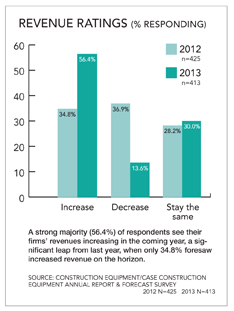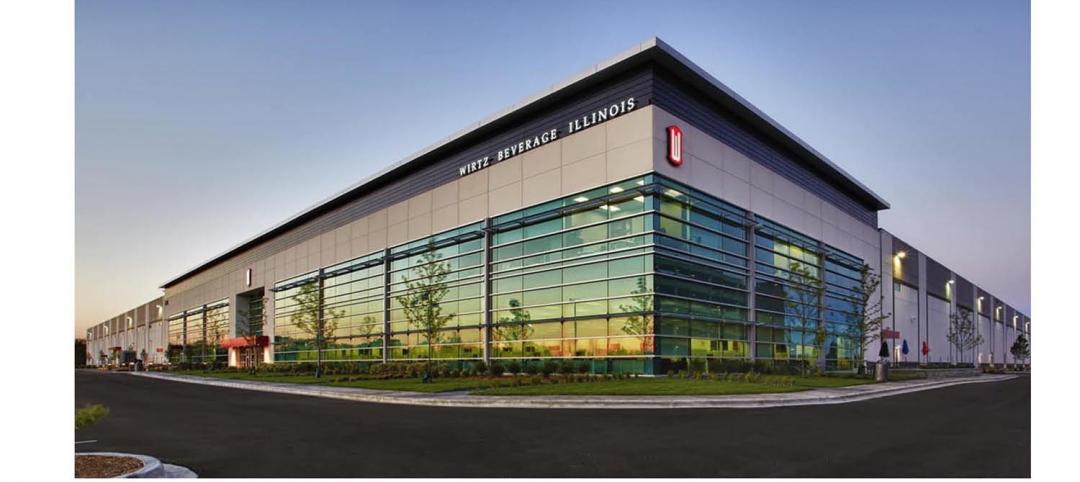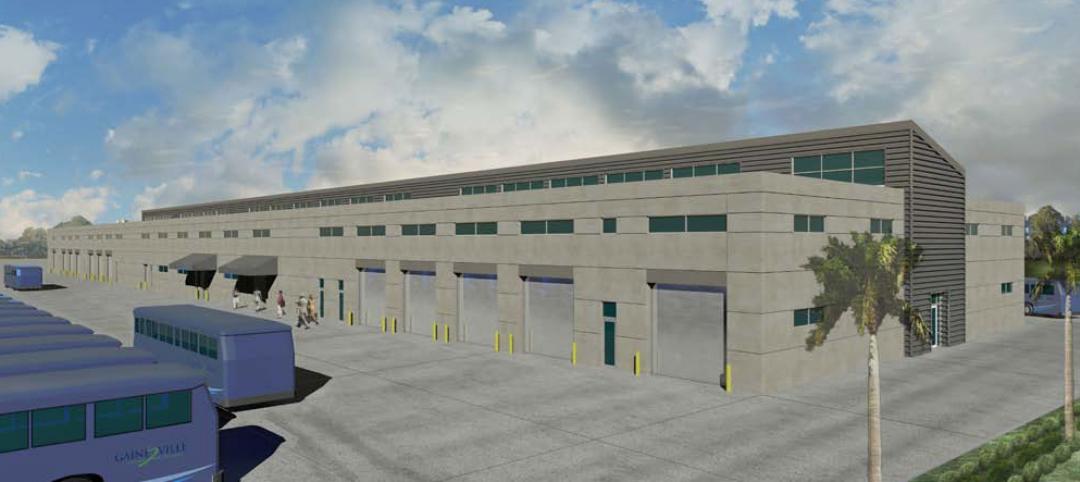Most economists say the U.S. is slowly emerging from the Great Recession, a view that was confirmed to some extent by an exclusive survey of 498 BD+C subscribers whose views we sought on the commercial construction industry’s outlook on business prospects for 2013.
The majority (52.2%) of respondents—architects, engineers, contractors, buildings owners, and others in the commercial, industrial, and institutional field—said their firms were in at least “good” financial health, compared to 49.7% last year.
But a markedly strong showing (86.4%) said their firms would be up in revenues or would at least hold steady in 2013, versus 80.2% last year—an increase that may be not only statistically significant but also most certainly welcome for an industry that could use a bit of cheering.
As was the case last year, more than three-fourths of respondents (75.7%) rated “general economic conditions (i.e., recession)” as the most important concern their firms will face in 2013—roughly comparable to the 78.4% who responded that way last year.
Economy Remains Top Concern for ’13
2013 2012
General economic conditions 75.7% 78.4%
Competition from other firms 44.9% 40.1%
Managing cash flow 37.6% 33.7%
Insufficient capital funding for projects 29.7% 34.5%
Softness in fees/bids 29.7% 28.0%
Government regulations/restrictions 26.6% 23.0%
Price increases (e.g., materials, services)15.7% 18.1%
Avoiding layoffs 16.4% 14.3%
Keeping staff motivated 14.3% 14.3%
Avoiding benefit reductions 11.9% 12.5%
Other factors were largely within the same range as last year, given the margin of error (about 3.5-4%). Competition from other firms (44.9%) went up slightly (from 40.1% in 2011), while having insufficient capital funding for projects declined a bit, to 29.7%, from 34.5% the year before. For both years, nearly three in four (73.4% this year, 74.8% in 2011) described the current business situation for their firms as “very” to “intensely” competitive—further evidence that AEC firms are still struggling for every dollar.
HEALTHCARE, DATA CENTERS LOOK PROMISING FOR ’13
Respondents were asked to rate their firms’ prospects in specific construction sectors on a five-point scale from “excellent” to “very weak.” (Respondents who checked “Not applicable/No opinion/Don’t know” are not counted here.) Among the findings:
- Healthcare continued to be the most highly rated sector, with nearly three-fifths of respondents (58.8%, vs. 54.6% last year) giving it a “good” to “excellent” rating.
- Data centers and mission-critical facilities were also up, with the majority of respondents (52.1%) in the good/excellent category, compared to 45.2% last year
- Senior and assisted-living facilities made a big jump, from last year’s 37.8% of respondents in the good/excellent category, to a majority this year, at 50.5%.
- Government and military work was rated good to excellent by 36.1% of respondents, down slightly from last year’s 41.1%.
- University/college facilities were rated good to excellent by 37.8% of respondents, versus 32.3% in 2011.
- Retail commercial construction got a slight vote of confidence, with nearly one-fifth of respondents (19.9%) stating they thought their firms would have a good to excellent year, nearly double last year’s 11.1%.
- Industrial and warehouse facilities might be staging a comeback: One-fourth (25.5%) of respondents whose firms engaged in that sector said they expect a good to excellent year in 2013; on the other hand, 35.8% said it would be weak or very weak.
Reconstruction—including historic preservation and renovations—accounted for at least 25% of work for more than a third (34.6%) of respondents’ firms, roughly the same as last year (36.3%). Office interiors and fitouts were down, with only 35.7% of this year’s respondents saying this sector would be good to excellent, compared to 42.7% last year.
The prospects for office buildings looked bleak, however, with only 15.6% saying that market would be good to excellent. The majority (55.2%) predicted office buildings would be “weak” or “very weak,” but that’s an improvement from 2011’s 67.3%.
The K-12 sector looked basically flat, with good/excellent responses from 22.9% of respondents this year, compared to 23.2% last year.
As for the use of building information modeling, one-fifth (20.2%) said their firm did not use BIM, about the same as in 2011 (20.6%). Of those who said their firms used BIM, a healthy 26.8% said BIM was used in the majority of projects, based on dollar value—precisely the same as last year. Only a few saw the use of BIM declining in the coming year. Nearly two-fifths (39.0%) of respondents said their companies would be beefing up their investments in technology.
On the communications front, nearly a third of respondents (32.9%) said they did not use social media. Of those who said they did, LinkedIn was the clear choice, at 85.1%, with Facebook in second place (49.5%) and Twitter bringing up the rear (21.1%).
Note: Of the 428 who gave their professional description, 42.1% were architects; 18.7%, engineers; 23.8%, contractors; 5.6% building owners, developers, or facility/property managers; and 9.8%, consultants or “other.” +
Related Stories
| Dec 4, 2012
Greenhorne & O’Mara signs letter of intent to join Stantec
Acquisitions of C3TS and Architecture 2000 also completed.
| Dec 4, 2012
Sto Corp. announces new distributor in the Carolinas
Company will now have coverage in several parts of North Carolina.
| Dec 4, 2012
Wirtz Beverage Illinois’ corporate headquarters completed
WBI Center, a new state-of-the-art facility, is designed by Ware Malcomb.
| Dec 4, 2012
Wagner joins Ghafari as Manager of Structural Engineering
Wagner comes to Ghafari from Walter P Moore, where he served as a principal, chaired the construction administration task force and led the design of numerous projects ranging in size from $10 million to $70 million.
| Dec 4, 2012
City of Gainesville to break ground on $33 million bus fleet maintenance and ops facility
The 140,000-sf facility will include dispatch, administrative and maintenance facilities.
| Nov 28, 2012
Project team to showcase design for first mixed-use retail center of its kind in Mexico City
Project reaching construction milestone, offering national model for urban development in Mexico.
| Nov 28, 2012
Cummins announces ratings classification for data center power systems
The Data Center Continuous ratings span the range of Cummins Power Generation’s high horsepower diesel generator sets, from 1 MW up to 2.5 MW, and will apply to both 50 Hz and 60 Hz configurations.
| Nov 28, 2012
Francis Cauffman appoints Stainbrook Director of Higher Education
Stainbrook has 16 years of experience as a strategic planner and urban designer working on complex projects on- and off-campus.
| Nov 27, 2012
SFIA releases technical guide for cold-formed steel framing products
The 114-page book covers both structural and non-structural applications, including section properties of SFIA member product profiles, and complete load and span tables for most applications.
| Nov 21, 2012
Architecture Billings Index positive for third straight month
All regions reporting positive business conditions















